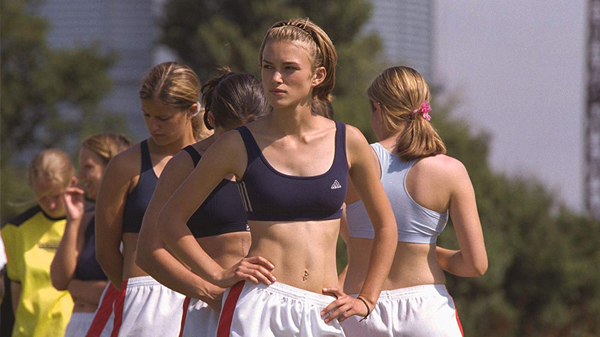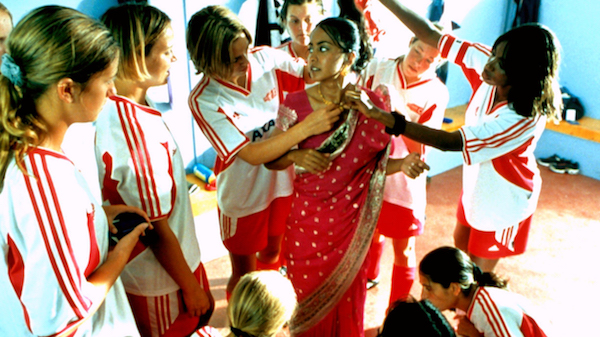Gurinder Chadha takes the stories of young people yearning for a wider future and brings them into focus with big-hearted ambition across all of her films. Ahead of Springsteen tribute Blinded by the Light, Roxana Hadadi looks back on Chadha’s high-scoring triumph Bend It Like Beckham: on its intersectionality, on its ambition, on its success.
“Anyone can cook aloo gobi. But who can bend a ball like Beckham?”
A young woman sits in her bedroom in an Adidas tracksuit, a sleeveless baby blue top and matching trousers. A TV plays highlights from a Manchester United game. A football jersey hangs on her wall. Directly above her bed, a shrine of a kind: David Beckham, midfielder for MUFC, gazes down upon her. A gigantic poster surrounded by numerous smaller ones of the man in movement—Beckham running, kicking, playing. The stylish and tattooed Beckham, international sex symbol, living his life as he pleases, doing what he loves.
In Bend It Like Beckham, the occupier of that bedroom, high school senior Jesminder Bhamra (Parminder Nagra), doesn’t lust after Beckham, or at least, doesn’t only lust after Beckham. The interest here is less sexual, and more existential: Jesminder’s desire isn’t to be with Beckham, but to be him. To have the freedom to pursue her passion of playing football professionally—a dream nurtured for years, but never voiced—to have the approval of her family to finally do what she loves.
But David Beckham is a white English man, and Jesminder Bhamra is a brown Punjabi Indian girl. The same rules don’t apply for cultures this different, and the nuance, humour, and emotional impact of Gurinder Chadha’s film lies in exploring their contrasts and overlaps. When Bend It Like Beckham was released worldwide in 2002, it raised questions about the first-generation immigrant experience, about inequality in professional sports, about the probability of individual dreams vs. cultural expectations. The film possessed all the elements of a girl-power cult classic: Nagra’s performance was praised for its relatability, humour, and charm. A determined, defiant Keira Knightley was introduced to audiences before her breakout role in Pirates of the Caribbean: The Curse of the Black Pearl. The film’s soundtrack, with songs by the Spice Girls’ Mel C and Victoria Beckham, Indian singer Gunjan, electronic duo Basement Jaxx, and All Saints’ Shaznay Lewis, also reflected cross-cultural exploration by featuring popular artists from wide-ranging backgrounds.
Seventeen years later, Bend It Like Beckham remains the highest-grossing film about football in the United States, and one of Fox Searchlight Pictures’s breakout hits of 2002. It makes sense, therefore, that Chadha’s latest film, Blinded by the Light, returns to a similar subject matter by centering on a young Pakistani man’s use of Bruce Springsteen’s music to find purpose and acceptance in his life. But before Blinded by the Light hits theaters, it’s essential to acknowledge that Bend It Like Beckham centered this first-generation-immigrant narrative first, with verve and intimacy. Bend It Like Beckham gave audiences glimpses into the immigrant experience and offered vital depictions of intersectional feminism, while also laying the groundwork not only for Blinded by the Light but for other films that tackle similar questions about individuals merging the experiences of one culture with another. We saw it in the Irish-American dichotomy in Brooklyn, identity struggles between China and New York in The Farewell, and Pakistan and Chicago in The Big Sick.
Bend It Like Beckham focuses on Jesminder—Jess to her friends, Jessie to her father, but always Jesminder to her mother—and her required role as a subservient woman within her family and her community, living in the shadow of Heathrow Airport in London. As the younger daughter, Jess is expected to help her mother with chores, get good grades, and be open to the possibility of an arranged marriage to another Indian. When her family and other Indian families gather, she is expected to be deferential, obedient, and pleasant. “It’s just culture, that’s all,” she says to her friends, but she still feels constrained by it. Her parents know that she is an avid football fan, but discourage her from playing in the park with boys, worried that her forwardness with them—and the mere idea of her bare legs in football shorts—will dishonor the family. Her older sister Pinky (a vivacious Archie Panjabi) is engaged to be married to a first-gen Indian man in a “love match” (meaning: not an arranged marriage), and Pinky and Jess’s parents grow increasingly tense over the wedding preparations. Mr. Bhamra (the inimitable Anupam Kher) and Mrs. Bhamra (Shaheen Khan) are both strict and hold high expectations for their daughters, but it’s because they came to England with nothing and built their children a stable life. When they’ve been given so much, the Bhamras reason, why would Pinky and Jess let their parents down? With a simultaneously supportive and judgmental community of other Indian families around them, Mr and Mrs Bhamra assume their daughters will do what they’re told—and not bring shame to the family by disrespecting their elders, not succeeding with exams, or bringing home a boy who isn’t Indian. “White, no. Black, definitely not. A Muslim, eh eh,” Jess says, when her teammates ask about her love life. Later on, when Pinky learns that Jess has a secret, she wonders whether her sister is dating a Muslim boy.
Jess’s aspirations, though, are focused on herself, and on what she doesn’t dare to voice out loud: that she could be a professional football player. When Jess is recruited by Jules (Knightley) to play on the local team, the Hounslow Harriers, she joins a world of female camaraderie and competition that she had never experienced when playing in the park with her male friends. Those boys had mocked her and leered at her, and although some of it was well-intentioned, some of it wasn’t—indicative of the dismissiveness and casual sexism that Jules had experienced, too. But the Harriers are assured, confident and welcoming, an eclectic mix of women of different races and body types. Chadha films the women training on the pitch, pushing each other forward, and then stripping down freely in the locker room, comfortable in their bodies and friendship. For Jess, the experience is a revelation, and the Harriers too are indicative of the film’s feminist intersectionality: in Bend It Like Beckham, the concerns of all members of the team, women who come from a variety of racial and financial backgrounds, are given equal weight. The challenges faced by the Harriers—from low viewer turnout at matches to discriminatory refereeing—acknowledge the varyingly challenging experiences of the female players as they unite in a shared struggle for the same opportunities as men. When Jess’s male friends come to watch the Harriers play, they comment on the chest size of the Harriers’ captain, Mel (Shaznay Lewis, in her acting debut). When a rival player pushes Jess down and calls her the slur “Paki,” the male referee punishes Jess for her retaliatory push. Although they have a male ally in their coach Joe (Jonathan Rhys Meyers), these women remain aware that he could leave them if a better job came along—like coaching a men’s team. Chadha places the audience alongside the players as they struggle to gain respect for their skill, and emphasizes how these women have each other’s backs through it all.
The strict divide between heteronormative male and female roles is present for both Jess and Jules in their personal lives. For Jess, Pinky’s wedding necessitates that she perform the role of dutiful daughter: dressing in brightly colored saris, putting on makeup, passing around tea and sweets for guests. She must be agreeable and conventionally feminine, and although it pains Jess to put on a pair of high heels instead of cleats, Bend It Like Beckham makes clear that Jess wants to want to be that person for her parents, but struggles to find how to stay true to herself without shattering their dreams. The relationship between Jules and her mother, Paula (Juliet Stevenson), is similarly tense. Paula objects to Jules’s short hair, to her insistence on wearing sports bras, and to her scoffing when Paula asks why Jules doesn’t bring any boys home. Paula wants a daughter who fits her own narrow conception of what a young woman would act like and look like, and she doesn’t understand that Jules’s physical presentation doesn’t indicate her sexual presentation or gender identification. When Paula storms into Pinky’s wedding and accuses Jess of breaking Jules’s heart, her mistaken assumption that her daughter is a lesbian presents an opportunity for Paula to actually learn who her daughter is.
In portraying both Jess’s and Jules’s personal lives, Chadha gives the women an opportunity to bond over their familial friction. And the filmmaker is evenhanded in her celebration of both Indian and English rituals: A pre-wedding event in which a table full of women comes together to make trays and trays of samosas is imbued with lived-in comfort, while a scene of Jules training with Joe demonstrates her physical strength. We see Pinky crushed when her engagement is briefly called off, and because of the honest bond that develops between the sisters throughout the film as they cover for each other with their parents, we know that her disappointment is as real as Jess’s when the Bhamras forbid her from continuing to play football. These women, who span the gap between Indian and British cultures, are developed with depth and complexity in terms of their professional ambitions, romantic aspirations, and relationships with their communities. The film’s acceptance of everyone, as in its treatment of the Harriers, is encouraging and resolutely feminist. And in how Chadha traces Jess as the holder of so many identities at once—a person performing different versions of herself to her friends, her sister, her parents, and her love interest and coach, Joe—the filmmaker portrays the first-generation experience as well, one in which individual desires are balanced against cultural norms.
When Mr. Bhamra, after seeing Jess play and realizing she should continue despite the racist response he himself experienced when playing cricket as a young man, gives her permission to leave Pinky’s wedding and compete in the Harriers’ final game, Chadha cuts between the football match (thrilling, aggressive, bloody and sweaty, with Jess in her element) and Pinky’s wedding (with a beaming bride, the proud Bhamras and the high-energy wedding party getting down on the dance floor). Neither cultural experience is given higher prestige or import in that duality. Instead, Chadha asks the audience to appreciate both, to learn how communities are formed around shared interests and eclectic backgrounds, and to respect how individuals within those systems, like Jess and Jules, can find a balance between what they desire and what is expected of them. Chadha’s film presents a portrait of what feminism and cultural transformation look like when treated with encouragement and acceptance, and makes it look as easy as when Jess dribbles past defenders to bend it like Beckham into the goal.
Roxana Hadadi (@roxana_hadadi) is a pop culture writer who writes about film, television, and culture with sides of judgment and thirst. She is a staff contributor for Pajiba and a regular contributor to Bright Wall/Dark Room, The A.V. Club, and Punch Drunk Critics. She is a member of the Washington DC Area Film Critics Association and the Alliance of Women Film Journalists and lives outside Baltimore, Maryland, US.
READ ME is a platform for female-led writing on film commissioned by Girls on Tops. Louisa Maycock (@louisamaycock) is Commissioning Editor and Ella Kemp (@ella_kemp) is Contributing Editor.





